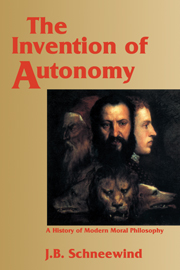Book contents
- Frontmatter
- Contents
- Preface
- Acknowledgments
- A note on references and abbreviations
- Introduction
- Part I The rise and fall of modern natural law
- Part II Perfectionism and rationality
- Part III Toward a world on its own
- 13 Morality without salvation
- 14 The recovery of virtue
- 15 The austerity of morals: Clarke and Mandeville
- 16 The limits of love: Hutcheson and Butler
- 17 Hume: Virtue naturalized
- 18 Against a fatherless world
- 19 The noble effects of self-love
- Part IV Autonomy and divine order
- Epilogue
- Bibliography
- Index of names
- Index of subjects
- Index of biblical citations
17 - Hume: Virtue naturalized
Published online by Cambridge University Press: 05 June 2012
- Frontmatter
- Contents
- Preface
- Acknowledgments
- A note on references and abbreviations
- Introduction
- Part I The rise and fall of modern natural law
- Part II Perfectionism and rationality
- Part III Toward a world on its own
- 13 Morality without salvation
- 14 The recovery of virtue
- 15 The austerity of morals: Clarke and Mandeville
- 16 The limits of love: Hutcheson and Butler
- 17 Hume: Virtue naturalized
- 18 Against a fatherless world
- 19 The noble effects of self-love
- Part IV Autonomy and divine order
- Epilogue
- Bibliography
- Index of names
- Index of subjects
- Index of biblical citations
Summary
I have argued that the voluntarist natural lawyers tried to keep God essential to morality while confining his role in it to his initial willful act of creating it. Machiavelli and Harrington did without God in establishing their principles, though they thought a stable republic needed a civil religion. Montaigne explored the possibility of morality without religion, and his follower Charron made some effort to create a systematic naturalistic theory. Although Hobbes worked out such a system quite fully, he retained a marginal role for God in transforming the dictates of prudence into genuine laws; and however tempting it is for us to read Spinoza as a wholehearted naturalizer of morality, his own understanding of the universe was profoundly religious. Mandeville gave a natural history of morality, only to add to it an account of a demanding principle that has something to do with the divinity. No one believed he meant that part of what he said, and in any case it is plain that he was more interested in outraging public sentiment than he was in presenting a serious and thorough naturalistic philosophical account of human life.
David Hume (1711–76) intended to give just such an account. He made very clear, moreover, his belief that religion is morally and politically detrimental to society and human happiness. He did not urge the establishment of a civil religion for the masses.
- Type
- Chapter
- Information
- The Invention of AutonomyA History of Modern Moral Philosophy, pp. 354 - 377Publisher: Cambridge University PressPrint publication year: 1997



